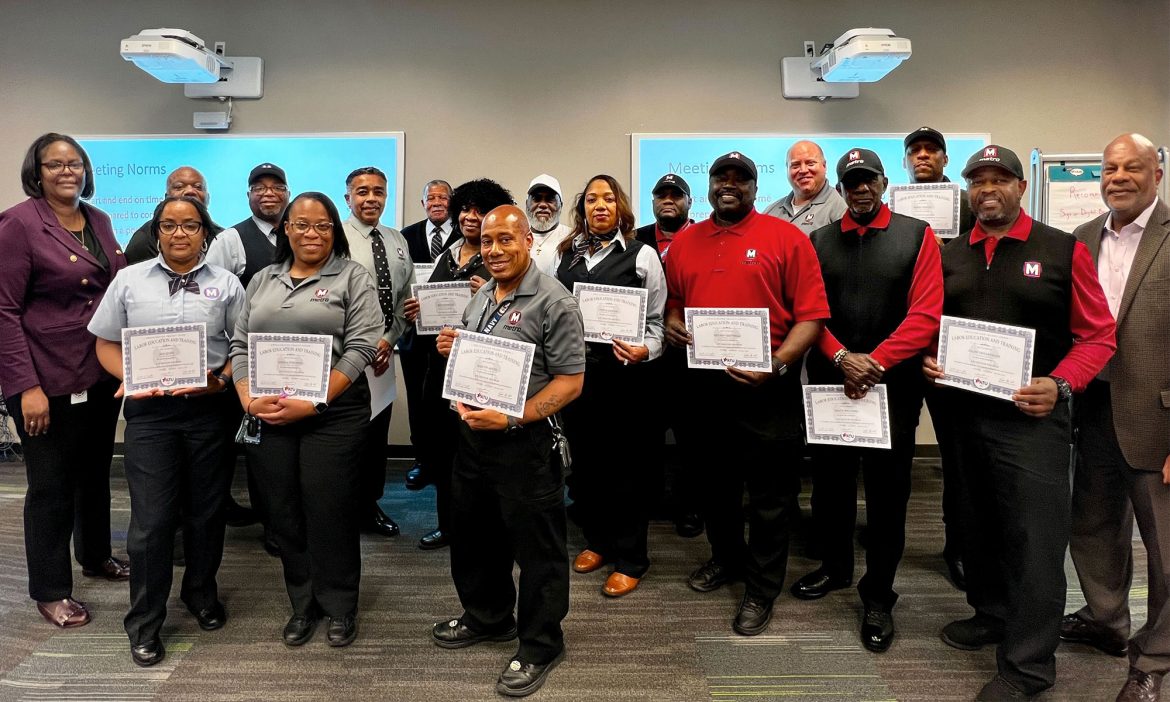
Bobby Morris has been a Metro Transit operator for more than three decades. While many factors contributed to his long career, he credits guidance from experienced operators for shaping his early success in the driver’s seat, “When I came in some of the, I like to call them heavy hitters, when they saw us struggling, they would step up,” says Bobby.
Now Bobby and other veteran operators like Orvin Wooten and Bruce Williams are stepping up to help the next generation of operators as part of a mentorship program through a partnership between Metro Transit, the Amalgamated Transit Union (ATU), and Local 788. They are just some of the more than a dozen MetroBus, MetroLink, and Metro Call-A-Ride operators to graduate from the program’s inaugural St. Louis class. This graduating class represents more than two centuries of collective experience at Metro Transit.
The mentorship program began in California in 2005 and has been adopted by almost 40 ATU chapters nationwide.
“This gives new operators a support system when they come in,” says Jamaine Gibson, Director of Apprenticeships and Workforce Development with ATU International. “We always say transit agencies do a great job teaching you how to operate a mass transit vehicle. But the true professional piece of it comes from everything else—the interaction with customers, work life balance, how you’re able to do this at a professional level every day.”
Building this system of support between veteran operators and new hires is beneficial in many ways, with retention chief among them. In cities where this program is already in place, Jamaine says retention rates are as high as 95%.
Mentorship is about forming relationships and fostering personal connections as a conduit for professional growth. With these ideals as a foundation, mentors draw from their experience to help new hires navigate a career at Metro Transit. They provide guidance and support, help develop skills, and build confidence. For many of the graduates of the program, they were offering this support long before the word mentorship entered the conversation.
“I was calling myself ambassador,” says MetroBus Operator Kimberly Quinn. “I would tell people I’m Metro’s ambassador because I’m always reaching out to help people, both employees and passengers.”
Call-A-Ride Operator Randy Henley has been with Metro Transit for ten years, including five as a line instructor. The mentorship program gives him new tools to build on the personal approach he takes to training new hires.
“I feel like I do that (mentoring) anyway because I like people to feel comfortable with me,” says Randy. “So, when I train somebody, I’m making sure they feel comfortable coming up and asking me certain things. If you have a more personal approach to the new hires, I think that would help because they’ll be comfortable.”
A common thread emerges when asked to share their advice to new hires or those considering a career in transit—patience.
“I would say you need to give it time. You can’t make a snap decision about this job right away. It’s one of those jobs where it takes a little time to know whether it’s right for you,” says Call-A-Ride Operator Robert Plummer. “What I love about Metro is every day is different. In 10 years, I have yet to have two days that are identical. It simply doesn’t happen. Every day is another day to do a little better.”
